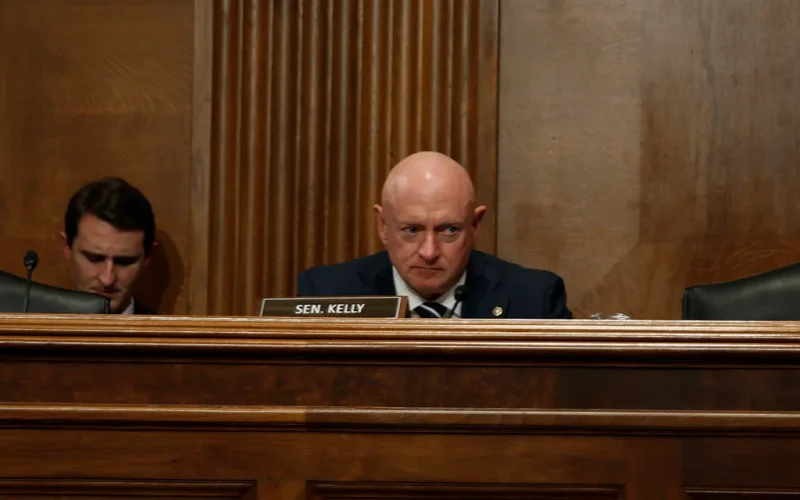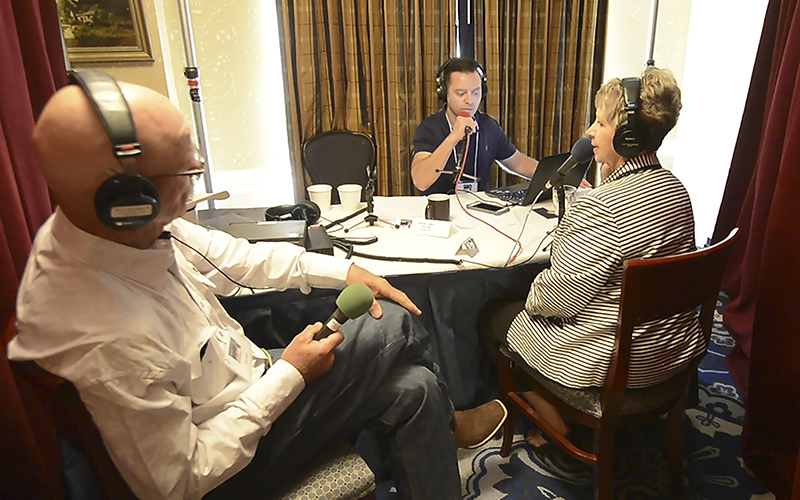
Tucson radio host Garret Lewis, of KNST 790 AM, interviews Fred, left, and Peggy Davis during one of several stops the southern Arizona ranchers made at a Washington gathering of talk-radio shows. (Photo by Ben Moffat/Cronkite News)
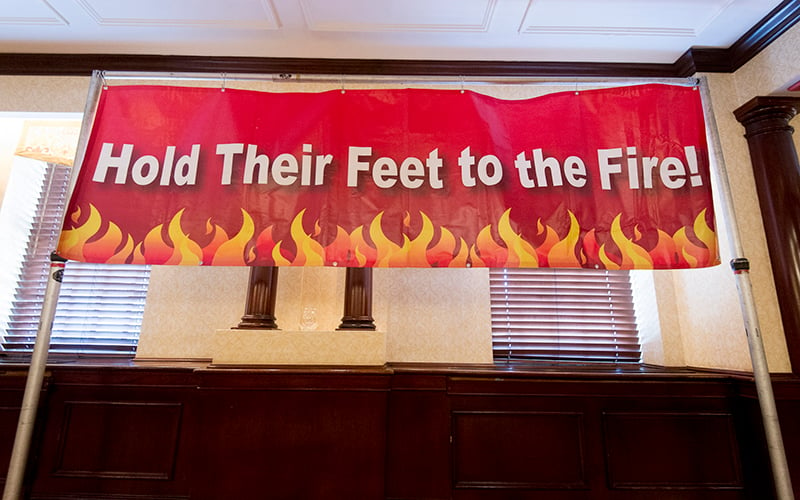
The “Hold Their Feet to the Fire!” event, organized by the Federation for American Immigration Reform, gathers talk-radio hosts from around the country in Washngton to push for reform. (Photo by Ben Moffat/Cronkite News)
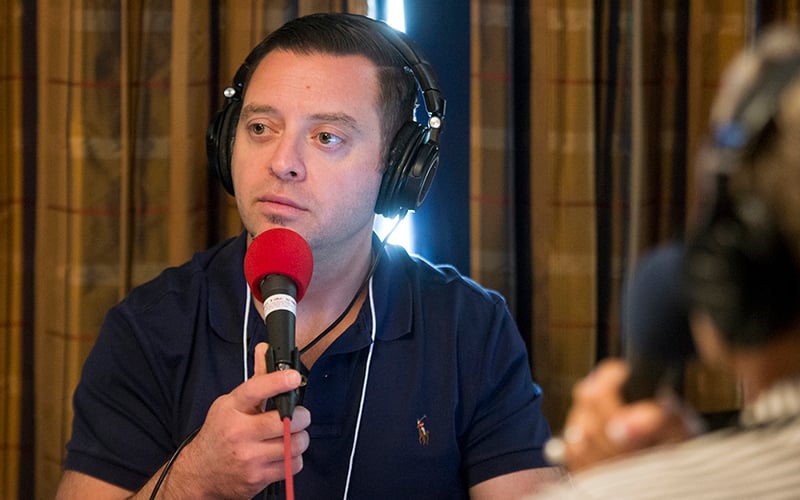
Tucson radio host Garret Lewis, of KNST 790 AM, interviews Arizona ranchers Fred and Peggy Davis in Washington as part of the “Hold Their Feet to the Fire” broadcasting event Wednesday. (Photo by Ben Moffat/Cronkite News)
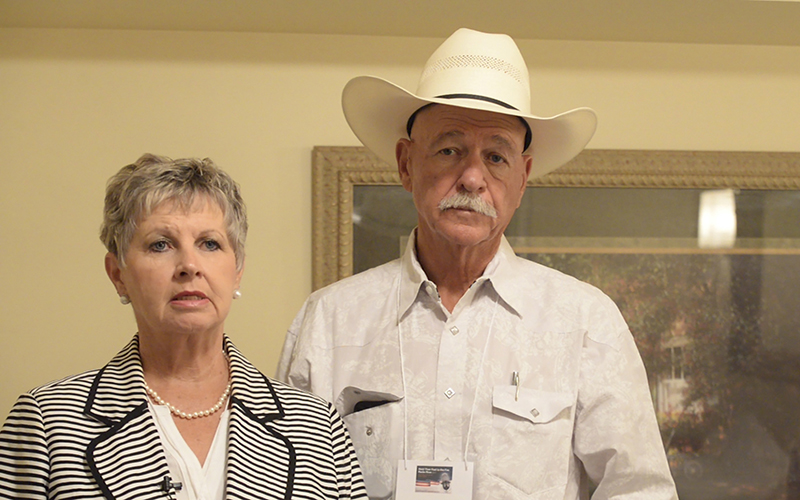
Peggy and Fred Davis, ranchers from southern Arizona, came to Washington this week to talk with a number radio talk shows about livigin near the border and the problems illegal immigration can cause. (Photo by Ben Moffat/Cronkite News)
By Ben Moffat | Cronkite News
Thursday, June 29, 2017
WASHINGTON – Tombstone ranchers Peggy and Fred Davis worked a different kind of range this week, strolling from booth to booth to tell talk-radio hosts about their lives on the front lines of the nation’s immigration debate.
Theirs was just one of the stories at the Federation for American Immigration Reform’s annual “Hold Their Feet to the Fire” gathering of talk-radio shows, which this year fell in the same week as the House voted on a pair of get-tough immigration bills.
“We accomplished something in the last election,” said Ira Mehlman, FAIR’s media director, said of the impact of talk radio. “We got the message across to the politicians that the American public wants something done. Now it is time to actually do it.
“The election campaign is over, the president is now governing, the Republicans have control of both houses of Congress,” Mehlman said. “They need to produce.”
See related stories:
That was the message the Davises delivered as they walked the carpeted hallways, making the rounds of radio shows broadcasting from the Phoenix Park Hotel in the shadow of the Capitol dome. They talked about living near the border and shared their dissatisfaction with enforcement of what they called a “national security issue.”
“It’s become more than just about my security and my family’s security,” Peggy Davis said during a break between interviews. “To me, this is my country, and it’s about national security.”
The Davises said illegal immigration has been causing problems for them and their neighbors for the last 20 years. They said their property has lost value, the cost of living and operating their ranch has shot up, and they feel less safe because of increased border crossings in recent years.
“They’re running through us to come and live with the rest of America,” Fred Davis said. “Ranching is a tough way to make a living to start with, and you add that increased cost – it’s affected our lives in a lot of ways.”
One of the Davises’ interviews was with Garret Lewis, a talk-radio host on KNST 790 AM in Tucson, who was at his sixth FAIR talk-radio gathering in Washington. He said he thinks there should be a range of actions taken to stem immigration, from a border wall to mandatory E-Verify for employment to strict enforcement of existing laws – but he’s not optimistic.
-Cronkite News video by Ben Moffat
“I wish Senator (John) McCain and (Jeff) Flake would actually wake up and do something, but they seem to be a lost cause,” Lewis said of Arizona’s two Republican senators.
He pointed to their lack of support for President Donald Trump during his 2016 campaign and said that means they are unwilling to take a harder stance on illegal immigration.
But Mehlman said the talk-radio event, now in its 11th year, is one way to deliver that message to lawmakers because of the power of the medium.
“Talk radio provides an unfiltered way to get messages out to the American people,” he said. “Unlike the established news networks, where it is filtered through the gatekeepers who run those networks, talk radio is just interaction, directly between people and the audiences.”
But where FAIR sees outreach to lawmakers, the Southern Poverty Law Center sees the work of what it calls an “anti-immigrant hate group” that peddles “nativist” views.
“This has been an annual event… to use the airwaves to spread an anti-immigrant message that in the past has been struggling to find footing,” said Ryan Lenz, a senior investigative writer for the SPLC.
But Lenz said FAIR is finding a receptive audience in Washington these days.
“In this current political environment, as (FAIR President) Dan Stein said in that article, it’s fun doing his job now, because there’s widespread support for anti-immigrant policies,” Lenz said, citing a Vice article on the group’s growing clout.
Fred Davis said he hopes the message will finally get through to lawmakers.
“The most important thing is the will in Washington to secure the border,” he said. “People ignore the national security issues down there. They get hung up on the humanitarian issue. Securing the border would also be very humanitarian because you’d have no more deaths in the desert.”


